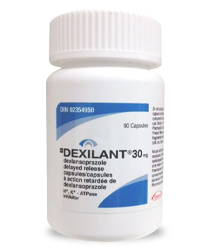What is Dexilant used for?
Dexilant is a brand medication used to treat GERD (gastroesophageal reflux disease). GERD is a condition where stomach acid enters the esophagus. This results in a burning sensation in the throat or chest. This can be accompanied by burping and a sour tasting feeling. Dexilant releases medication in two stages to provide treatment for, and hopefully help heal, the damage done to the esophagus. Dexilant works but reducing the amount of stomach acid the body produces. The medication has two separate actions. The first one works within an hour of taking the medication and the second one is applied several hours later. Click above on the dose/strength you require to buy Dexilant online at discounted price from Canadian Pharmacy.
Dexilant (Dexlansoprazole) FAQs
How To Use Dexilant?
This medication may be prescribed for 8 weeks to 6 months to promote healing and reduce acid production depending on how severe the esophagus damage may be. It may also be used short term to treat heartburn associated with GERD. The dosage is between 30mg and 60mg per day depending on your doctor’s instructions.
Dexilant can be taken with or with food but be sure to drink plenty of water. The capsule can be swallowed whole or with it’s contents sprinkled onto applesauce. Do not chew the granules inside the capsule. If you miss your daily dose simply take it when you remember. If it is almost time for your next dose, skip the missed dose and simply take the next dose on schedule. Do not take a double dose to catch up.
You may have to make certain changes to your lifestyle in addition to taking dexilant to treat GERD. This includes possibly changing your diet and quitting smoking. Your doctor will advise you if this is necessary.
What are Side Effects of Dexilant?
These side effects should resolve themselves once your body adapts to the medication. If they become too uncomfortable to manage contact your doctor.
- loss of voice
- runny nose
- loss in sexual ability, desire, drive, or performance
- metallic taste
- difficult or painful urination
- continuing ringing or buzzing or other unexplained noise in the ears
- feeling of constant movement of self or surroundings
- excess air or gas in the stomach or bowels
- trouble sleeping
- nasal congestion
- falls
- Abnormal dreams
- ear pain
- sunburn
- passing gas
- bloated or full feeling
- change in taste or bad, unusual, or unpleasant (after) taste
- sensation of spinning
- muscle or bone pain
- burning or itching around the anus
- difficulty with moving
- ear congestion
- sneezing
- redness of the face, neck, arms, and occasionally, upper chest
- body aches or pain
- sore throat
Contact your doctor if any of the following occur:
- muscle spasms (tetany) or twitching
- lightheadedness, dizziness, or fainting
- pain or discomfort in the arms, jaw, leg, back, or neck
- vomiting of blood or material that looks like coffee grounds
- swelling of the eyelids, face, lips, hands, or feet
- sores, ulcers, or white spots in the mouth or on the lips
- confusion
- fast, irregular, pounding, or racing heartbeat or pulse
- headache
- cough
- pounding in the ears
- vomiting
- watery or bloody diarrhea
- muscle pain, cramps, or weakness
- red, irritated eyes
- difficult or labored breathing
- sweating
- nausea
- drowsiness
- rash, hives
- unusual weight gain
- unusual bleeding or bruising
- diarrhea
- shakiness in the legs, arms, hands, or feet
- seizures
- swelling of the body, feet, or ankles
- incoherent speech
- chest tightness or heaviness
- joint pain, stiffness, or swelling
- chills
- red skin lesions, often with a purple center
- trembling
- chest pain or discomfort
- numbness or tingling in the hands, feet, or lips
- swollen, painful, or tender lymph glands in the neck, armpit, or groin
- fever
- continuing stomach pain
- Blistering, peeling, or loosening of the skin
- Burning, crawling, itching, numbness, prickling, “pins and needles”, or tingling feelings
This is not an exhaustive list of potential side effects when taking Dexilant. Be sure to make sure you are aware of these when consulting with a doctor or pharmacist
What are Drug Interactions of Dexilant?
- Methotrexate
- Levothyroxine
- Warfarin
- Sunitinib
- Saquinavir
- Dacomitinib
- Ledipasvir
- Pexidartinib
- Vismodegib
- Dextroamphetamine
- Methamphetamine
- Velpatasvir
- Nilotinib
- Acalabrutinib
- Ketoconazole
- Mycophenolate Mofetil
- Benzphetamine
- Pazopanib
- Neratinib
- Nelfinavir
- Capecitabine
- Amphetamine
- Gefitinib
- Dasatinib
- Bosutinib
- Erlotinib
- Lisdexamfetamine
- Atazanavir
- Selpercatinib
- Rilpivirine
- Secretin Human
